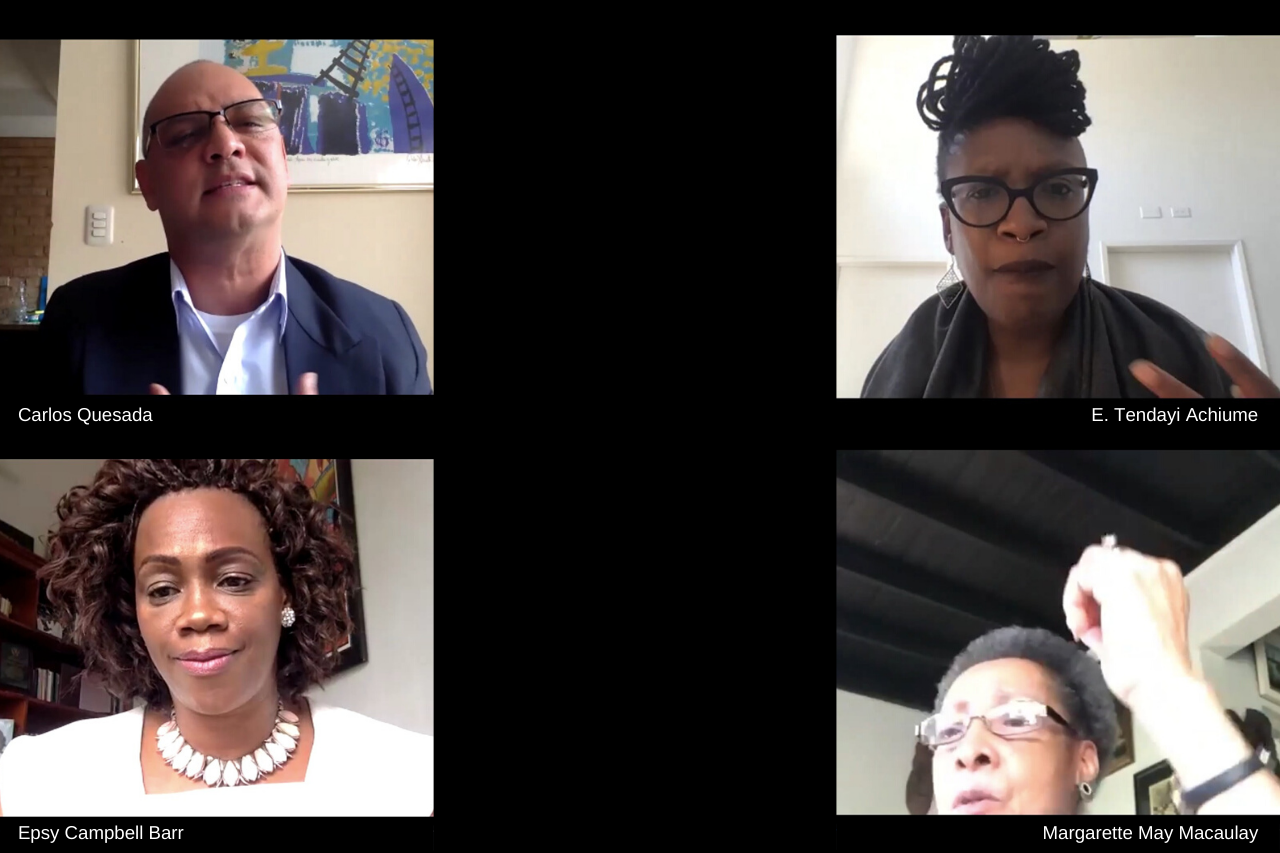Race and Equality hosts discussion on the fight against systemic racism in the Americas
Washington D.C., July 9, 2020.– The International Institute on Race, Equality and Human Rights (Race and Equality) held the webinar “International Response to Racial Injustice and Police Brutality in the […]

Washington D.C., July 9, 2020.– The International Institute on Race, Equality and Human Rights (Race and Equality) held the webinar “International Response to Racial Injustice and Police Brutality in the Americas” on July 7th. The webinar highlighted the need to use a comprehensive, multi-disciplinary approach to combat racism and racial discrimination against Afro-descendants across the region.
Costa Rican Vice President Epsy Campbell Barr; Margarette May Macauley, Rapporteur on the Rights of Afro-descendants and on the Rights of Women at the Inter-American Commission on Human Rights (IACHR); and Tendayi Achiume, United Nations Special Rapporteur on Contemporary Forms of Racism, Racial Discrimination, Xenofobia and Related Forms of Intolerance, all offered reflections during the webinar, with Race and Equality’s Executive Director Carlos Quesada serving as moderator.
After several African Americans in the U.S. were killed by police officers and white civilians during April and May, and particularly after the killing of George Floyd on May 25th in Minneapolis, protests against racism and discrimination have emerged across the Americas and the world. The panelists agreed that governments, civil society organizations and multilateral organizations must take advantage of the moment to make real change by ensuring societal buy-in and implementing tangible reforms.
Ms. Achiume applauded the United Nations Human Rights Council’s rapid adoption of a resolution that energetically condemned racist and violent practices by police and security forces against Afro-descendants. “This time, there was a different way of thinking about the nature of the problem,” she said, “it wasn’t just because of a few bad apples, but this time there was recognition that we have a systemic problem and that racism is endemic.”
Vice President Campbell, who began her intervention by declaring her solidarity with George Floyd’s family and friends, pointed out that silence and complicity have allowed too many human lives to be lost for no reason other than the color of people’s skin. She applauded the Black Lives Matter movement and celebrated the fact that its message is being heard and carried worldwide, predominantly by young people who are no longer willing to tolerate injustice.
Commissioner Macaulay reminded the audience that one of the key objectives of the IACHR has been to shine a light on the reality of discrimination, speaking forcefully of a “genocide” against Afro-descendants. “I have asked a lot of people in the region about the situation of Afro-descendants in their countries, and a lot of them tell me, ‘we don’t have Afro-descendants’ when they certainly do – they don’t even know that they are there,” she said. For Commissioner Macaulay, the unforgettable image of a police officer with his knee on George Floyd’s neck and his hands casually in his pockets was a “wake-up call” for the international community.
Proposals for change
The three panelists made several proposals for combatting racism and discrimination. Ms. Achiume pointed out that the Human Rights Council resolution calls for the High Commissioner for Human Rights to investigate systemic racism and report on her findings, proposing that this mandate represents an opportunity for civil society to feed into high-level processes and keep the discussion alive.
Meanwhile, Vice President Campbell called for five concrete steps: a global campaign against racism coordinated among the major multilateral organizations; training and education programs for media, taking advantage of its power to educate the public; the creation of a private-sector network to share best practices for diversity and inclusion; a special session of the Organization of American States’ Permanent Council to discuss racism and racial discrimination in the region; and the formation of a permanent organization to monitor racism and discrimination.
Commissioner Macaulay called for civil society organizations in the Americas to continue pressuring the IACHR for more proactive and creative actions to defend Afro-descendants’ rights. She agreed with Vice President Campbell’s suggestion for more efforts to educate the media sector, saying, “the media publicizes the arrests of African Americans – how many arrests of white people do we see? Very few, which puts into society’s minds that it is Black people who are the problem.” She also called for more training and reform within police forces and national justice systems, highlighting that far more African Americans than white Americans are imprisoned in the U.S. She put special emphasis on the role of lawyers in the justice system, expressing concern at the frequency with which prosecutors and defense attorneys negotiate guilty pleas even when clients profess their innocence.
Commissioner Macaulay also lamented the “shameful” fact that only five countries (Antigua & Barbuda, Costa Rica, Ecuador, Mexico and Uruguay) have ratified the Inter-American Convention against Racism, Racial Discrimination and Related Forms of Intolerance.
During the event’s question-and-answer period, audience members wondered how to keep discussions of racial discrimination in the spotlight. Others asked how the UN and Inter-American systems can support activists who are denouncing rights violations and working for change.
To close the event, Carlos Quesada reiterated Race and Equality’s commitment to continue working alongside grassroots activists to win more ratifications of the Convention against Racism.
Re-live the discussion through our Facebook page, or below:

